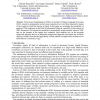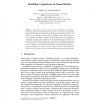11 search results - page 2 / 3 » Unsupervised and supervised exploitation of semantic domains... |
ISICT
2003
13 years 6 months ago
2003
Word Sense Disambiguation (WSD), in the field of Natural Language Processing (NLP), consists in assigning the correct sense (semantics) to a word form (lexeme) by means of the cont...
ACL
2009
13 years 3 months ago
2009
Modern models of relation extraction for tasks like ACE are based on supervised learning of relations from small hand-labeled corpora. We investigate an alternative paradigm that ...
EMNLP
2010
13 years 3 months ago
2010
Multi-category bootstrapping algorithms were developed to reduce semantic drift. By extracting multiple semantic lexicons simultaneously, a category's search space may be res...
CICLING
2007
Springer
13 years 11 months ago
2007
Springer
Although the literature contains reports of very high accuracy figures for the recognition of named entities in text, there are still some named entity phenomena that remain probl...
BMCBI
2010
13 years 5 months ago
2010
Background: Word sense disambiguation (WSD) algorithms attempt to select the proper sense of ambiguous terms in text. Resources like the UMLS provide a reference thesaurus to be u...


